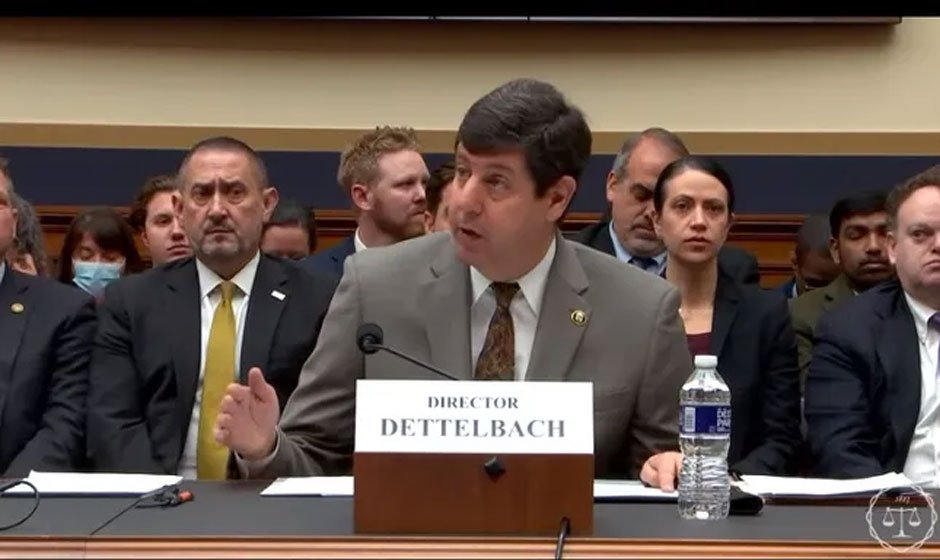Introduction
In a recent Capitol hearing, Steven Dettelbach, the director of the Bureau of Alcohol, Tobacco, Firearms, and Explosives (ATF), defended the agency’s policies aimed at regulating gun dealers and implementing a new prohibition on stabilizing brace devices. This hearing, held by the House Judiciary Committee, witnessed a tense exchange between Dettelbach and GOP members who criticized what they perceived as inconsistent guidance on the upcoming ban. The controversy surrounding the stabilizing brace devices centers on their possession without a license becoming illegal as of June 1. This article explores the key arguments and positions presented during the hearing.
Questioning ATF’s Guidance
During the hearing, Republican Chairman Jim Jordan and other GOP members criticized ATF Director Steven Dettelbach for what they deemed inconsistent guidance on stabilizing brace devices. Jordan expressed concern that individuals who currently own these devices would suddenly become felons overnight due to the changing regulations. The lawmakers accused ATF of providing contradictory information over the years, leading to confusion among gun owners.
Defense of the New Rules
Director Dettelbach defended the new rules signed by Attorney General Merrick Garland. He assured the committee members that unwitting violators of the new regulations were unlikely to face immediate prosecution or the severe penalty of a 10-year prison sentence. Dettelbach also emphasized that the new policies were aimed at enhancing public safety and reducing potential harm associated with the misuse of firearms. He maintained that the ATF’s primary focus would be on addressing high-priority cases rather than targeting law-abiding gun owners.
Implementation of the Pistol Brace Rule
Following the June 1 deadline, individuals in possession of millions of stabilizing brace devices will be required to detach, register, or destroy them. The ATF’s new regulations aim to restrict the use of these devices, which effectively enable a pistol to function similarly to a short-barreled rifle. The rules have already faced legal challenges, and a recent federal appeals court decision dealt a blow to a similar ban on bump stocks. Nonetheless, other appeals courts have upheld bans on such devices in previous years.
Criticism of Crackdown on Gun Shops
Rep. Matt Gaetz brought attention to a constituent who had their Federal Firearms License revoked after 46 years of holding it. The constituent claimed to have relied on Florida’s background check system, which cleared the sale. Gaetz questioned the justification for destroying his constituent’s livelihood. Director Dettelbach defended the new “zero tolerance” policy under President Biden’s administration, which encourages the ATF to revoke licenses for willful or repeated violations. Dettelbach stressed that the vast majority of firearm dealers comply with regulations and that only a small minority face license revocation.
Ongoing Evaluation of the Impact
Rep. Tom Tiffany inquired about the effectiveness of the crackdown on gun shops and its impact on reducing crime rates. Director Dettelbach acknowledged that there are various factors contributing to gun crime and emphasized the importance of addressing all these factors comprehensively. While he acknowledged that it is challenging to attribute a reduction in crime solely to the crackdown on gun shops, he emphasized the need to work on multiple fronts to combat the issue effectively.
OIG Report on Gun Shop Inspections
The Department of Justice Office of Inspector General recently conducted an audit of the ATF’s gun shop inspection program. The report highlighted inconsistencies in the application of penalties and expressed concerns about the perception among Federal Firearms License holders that certain violations were tolerated. The report also revealed a significant number of active gun shops that had not been inspected in over a decade, raising questions about the effectiveness of the ATF’s inspection practices.
Conclusion
The congressional hearing provided a platform for the ATF Director to defend the agency’s policies on cracking down on gun dealers and implementing a new prohibition on stabilizing brace devices. While GOP members criticized the ATF for what they perceived as inconsistent guidance, Director Dettelbach defended the new rules and emphasized their aim of enhancing public safety. As the June 1 deadline approaches, the implementation of the stabilizing brace rule continues to be a subject of debate and legal challenges.






